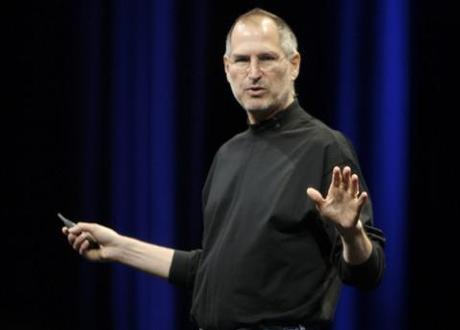
Steve Jobs. Photo credit: Ben Stanfield/Flickr
The technology world is still reeling from the news that Apple CEO and messianic figurehead Steve Jobs is stepping down due to health reasons. Since Jobs returned to the company in 1996 he has transformed it into a $350 billion business – one of the most valuable companies in the world – and has extended its influence beyond technology and into media, telecoms and retail.
At least one columnist called for Jobs to be awarded a Nobel prize. Jobs is so special, argued Oh Young-jin in The Korea Times, that even though he may not fall under any of the current Nobel Foundation categories, “the foundation could create one especially for him, perhaps a lifetime achievement award, or more specifically, one for promoting the best human spirit.” Whether or not that happens remains to be seen, but, in the meantime, there have been plenty of other attempts to assess Jobs’s legacy.
- Disruptive innovation. Walt Mossberg at The Wall Street Journal claimed nothing less than that Jobs “changed the way people live.” He did this by developing brilliant and disruptive new products such as the iPod and the iPhone, “because he was willing to take big risks on new ideas, and not be satisfied with small innovations fed by market research.” Mossberg’s colleague Steven Johnson agreed, and extended this idea to suggest that Jobs’ greatest legacy is his marriage of technology and culture. Johnson said that Jobs was neither just a “master salesman or a master designer, though he is clearly both. His real gift, from an early age, has been the ability to see that these two worlds could, and should, productively collide.” Praising Jobs for showing a non-geek crowd that computers could be fun and useful, Johnson argued: “It isn’t just that he made computers cool or put them in pretty boxes. It’s that he put those computers in new conceptual boxes.”
- Ignore profits. Clayton Christensen at Reuters claimed that the biggest lesson we should take from Jobs’s success is that more companies should pursue high-risk, disruptive product strategies at the expense of short-term profits. “I believe that Apple’s lack of focus on profitability has actually made it one of the most successful companies in the history of capitalism,” he wrote. “Steve Jobs’s legacy isn’t the Mac. It’s not the iPhone. Or the iPad. His legacy is in the creation of Apple itself, reminding us that profit is not the ultimate goal, but rather a consequence of something greater.”
- Business legacy. Other writers have focused on Jobs’ transformative effect on the business culture at Apple. Philip Delves Broughton at The Financial Times assessed Jobs’s “managerial legacy,” pointing out that he assembled a small, close-knit group of talented executives who exerted extremely close control over the rest of the company. These people make orders and “expect them to be fulfilled with little questioning … Employees are not empowered to make a difference. They are expected to do a clearly defined job and do it as well as they can.” Broughton claimed that “Apple’s structure allows for rapid decision-making at the top and unwavering discipline and efficient execution at the bottom … Despite its west coast cool, Apple has long had more in common with a well-drilled army.” The New York Times looked at the impact of Jobs’s Apple on the media and advertising worlds. Respect for Jobs’s branding talent was unanimous, with one executive quoted as saying that Apple “has been the brand that is brought up thousands of times a day in creative meetings between agencies and clients as the the icon of creative purity and integrity.”
- Paid-for content. Charles Arthur at The Guardian focused on one very specific aspect of Jobs’s legacy: his transformation of the digital content marketplace via iTunes and the App Store. Referring to the traditional reluctance of record labels and film studios to distribute their content online, Arthur argued that “Jobs pried open many content companies’ thinking, because his focus was always on getting something great to the customer with as few obstacles as possible … except he thought people should pay for what they got.” Arthur thought that these companies might miss having Jobs around. “So if you’re wondering how Job’s departure affects the media world,” he said, “consider that it’s the loss of one of the biggest boosters of paid-for content the business ever had. Who’s going to replace that?”

